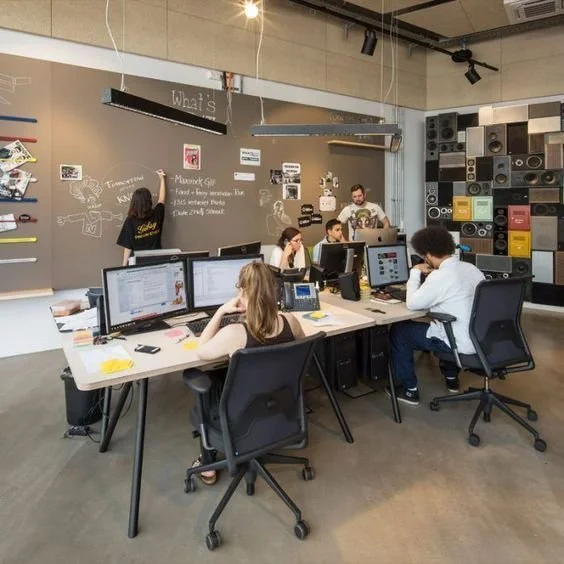To Be or Not To Be (In The Office)
Image Source: Pinterest
Where older generations have benefited from working remotely, people who pre-pandemic carved out their place in their company and communities – started families and spent decades developing life and networks in and outside of work – younger professionals share a different experience. Moving to a new city, starting fresh, and working remotely can be disastrous.
Humans are social creatures. And more than any other generation, we, Gen Z, need to be in the office. We need to connect, grow, stumble, have water cooler conversations, observe company energy and interactions, be mentored (IRL), and see who is using conference room B at three and ultimately not work remotely at the cost of convenience, connection, health, and professional growth.
According to the ‘Generation Z and the Lure of the Office’ report “81% of the Gen Z workforce feel disconnected from their colleagues when working remotely” and “many young employees who entered the workforce in 2020 or 2021 have reported working remotely makes it difficult to be productive and to bond with colleagues, which is negatively impacting their mental health.”
Where older generations are positively impacted by skipping their commute and staying home/within their established ecosystems, younger generations need to go in (and Elon seniors agree).
Elon University senior Elizabeth Wieboldt says, “It sounds crazy but after having an abundance of virtual roles and internships, my roommates and I are dreaming of cubicles. We’ve all felt disconnected from roles and companies that have been 100% remote. We’re craving a human environment, turning our heads to the right and asking a question to a peer rather than hitting someone up on Slack, waiting for an answer from someone 500 miles away to ping us back. Working remotely can be isolating and we’re ready to learn and grow in the office.”
Image Source: Pinterest
Elon University senior Michelle Marder says, “I think people forget that a majority of recent graduates, as a byproduct of the pandemic, haven’t experienced the office environment like generations prior. Our high school and college experiences have included virtual internships, classes, and a lack of human interaction that has been haunting us and our educational experience for the past few years. With so much of our lives online as is, and the past few years being pushed into that space as well, we’re eager to work in person.”
Sports Management major Gwyn Webster says “With graduation right around the corner, one of my biggest fears is securing a new remote job, in a new city where I spend my 9-to-5 inside my apartment, rather than leaving my apartment during that time frame. That type of reality would be isolating, and lonely, and would affect my mental health and my ability to grow as a young professional. What looks like freedom to others is my worst nightmare.”
There is a lot to learn and experience as young professionals in the office. Former AOL CEO Tim Armstrong argued in an interview that employees under the age of 30 could be missing out on “the largest career-learning cycle” of their lives by working remotely and we are limiting our networks by not going into the office. He said “If I had one piece of advice for younger people in their 30s: Go back to work,” he said. “Even if your company doesn’t let you come back, create your working environment and invite some people over.”
Working remotely does not work for most young people. We want to compliment coworkers' new shoes (something you can only do in person) and mirror those working around us. Gen Z wants to discuss red-wine couch disasters on lunch breaks and meet with mentors over mid-day coffee chats, not work two feet from our beds in our tiny, starter apartments. We want to walk out our front doors each morning, ask questions get answers in real time, and grow and interact as young professionals in the office.
Will we see you in the office? Keep this conversation going on Instagram @theedgemag.
Xx your favorite Edge seniors.

